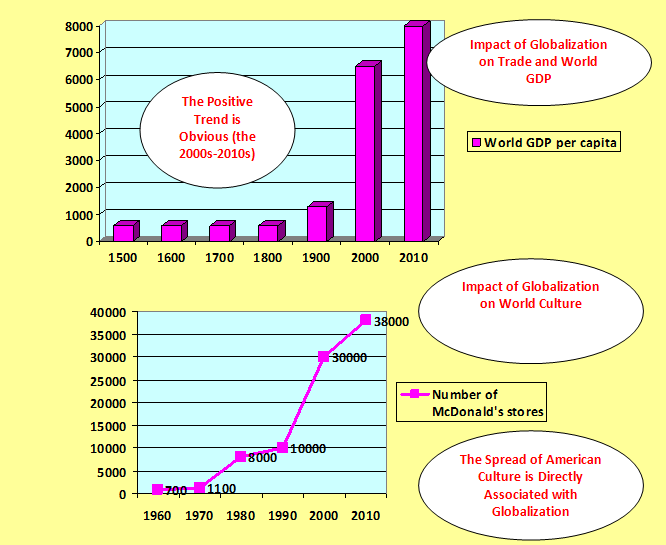Globalization is an incredibly complex phenomenon, all aspects of which are not fully understood. Politics, economies, and cultures are all affected by the process of globalization. While some might view it positively and believe that globalization leads to a greater cultural and economic integration which benefits the world as a whole, others see it as an aggressive expansion of the dominant cultures that detrimentally affects less strong and developed nations and cultures.
It is worth noting that globalization is not exactly a recent phenomenon. Some of the trends of globalization can be seen throughout history, as most nations strived to cooperate with each other to a mutual benefit. The process, however, grew momentum in the late twentieth century, when technological advances allowed for quick and simple communication and the model of a free market economy was accepted by most of the world. Due to these factors, the world has changed rapidly in the last few decades. It is now generally agreed that there are both positive and negative sides of globalization.

From a cultural point of view, some people worry that globalization does not create a diverse mix of cultures, but rather enables cultural expansion that leads to smaller cultures being assimilated by the dominant ones. The opponents of globalization believe that the emerging global culture is largely based on the Western one and that this process resembles a softer version of colonialism. However, others deny that notion. Hassi and Storti (2012) note that “globalization makes individuals aware of the diverse national cultures in the world which are multiple in numbers and distinct in nature. Hence, globalization strengthens national cultures rather than undermine them” (p. 9). Technological advances play a very important role in that because they allow people from different nations to listen to and communicate with each other easily. That creates a more open world for everyone and deters a dominant culture from imposing its values.
Globalization can also incentivize nations to spread around their beliefs and ideas, rather than show off their military strength. Relying on promoting nation’s values in order to win over the hearts and minds of people around the world is a policy known as “soft power”. An example of that is how American popular culture was used as a propaganda tool during the Cold War (Crothers, 2012). Soft power is an important factor in politics, and it is evident that it would be beneficial to the world if more countries attempted to gain influence through promoting their values and their way of life, instead of imposing them in armed conflicts. Supporters of globalization also believe that the process will inevitably assist with spreading democracy around the world, as oppressive societies will have to open up to be able to compete in the integrated world (Crothers, 2012).
There are also conflicting opinions on the effect of globalization on the economy. It is generally agreed that the effect is mostly positive since it allows for free movement of workers, goods and services, and means of production, which increases the average global prosperity (Bozyk, 2012). However, there are some concerns that less developed countries might suffer from the harsh conditions of the free market competition. In addition, cultural influence of the main actors also plays a role, since it allows for corporations to easier infiltrate the markets.
Globalization is a complicated process that combines many different aspects. While there are some dangers associated with it, there is also a great amount of benefits. Regardless, it appears that globalization is a natural process and it might be better to adapt to it, rather than fight it.
References
Bozyk, P. (2012). Globalization and the transformation of foreign economic policy. New York, NY: Ashgate Publishing.
Crothers, L. (2012). Globalization and American popular culture. New York, NY: Rowman & Littlefield Publishers.
Hassi, A., & Storti, G. (2012). Globalization and culture: The three H scenarios. New York, NY: INTECH Open Access Publisher.